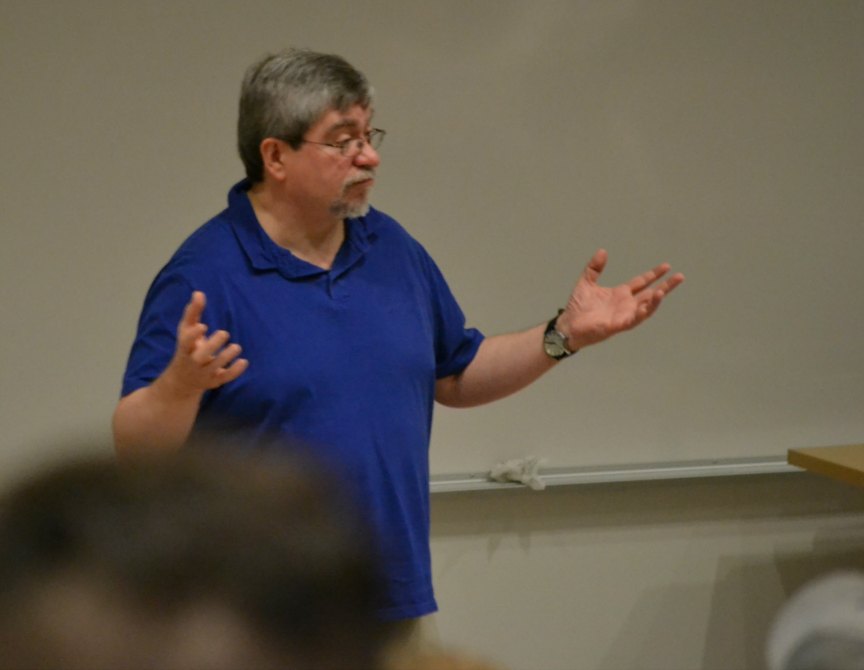
Toastmasters volunteer Lawrence Sutherland speaks to first-year pharmacy students. Students take a four-week course to help build their confidence in giving formal and informal speeches.
Jasmine Han wasn't necessarily terrified of public speaking. The second year pharmacy student had experience speaking in public before and considers herself an extrovert.
So, how could she benefit from a mandatory Toastmasters class in the first few weeks of her pharmacy degree? After all, she had other things to worry about as she navigated her first year as a university student.
"It was one of the most engaging classes I had in my first year," says Han. "I was comfortable with public speaking but I also saw that I could improve in a lot of ways - maintaining eye contact, body language, controlling any nervousness. At first, like most students, I didn't see the need for the class but, in the end, I realized that is very helpful for my career."
First year pharmacy students take a four-week Toastmaster's Speechcraft course - four evenings and one Saturday - to help build their confidence in giving formal and informal speeches.
The faculty, which has offered the program for over 40 years, is the only one at the University of Alberta to include it as mandatory curriculum. Up to 40 volunteers from different Toastmasters Clubs across the Capital Region bring their expertise to mentor more than 130 students
"It's been a great program -the enthusiasm of the Toastmasters inspires our students. The program provides a safe place for our students to improve their public speaking skills while building a sense of community." says Lisa Guirguis, associate professor, Faculty of Pharmacy and Pharmaceutical Sciences.
Volunteer Ben Parraguez says the program is made up of two parts - impromptu speaking and prepared speeches. Parraguez has been working with University of Alberta pharmacy students since 2010.
"Students are easier to teach than professionals," says Parraguez, an engineer who has volunteered with Toastmasters for the past 13 years. "Shy students in particular need to find their voice and we are here to help facilitate that. Mentoring students is great because they have that mindset to want to learn, so as a mentor, it's very easy to teach them."
Parraguez, an engineer, says the class is divided into about 12 groups with three Toastmaster volunteers per group. He says providing three viewpoints on each students' speeches is about the right number to help students progress and become better speakers.
"I benefited a lot from the course," says Han. "It was really what you make of it - there's a lot of constructive feedback, so you have the confidence to know you can do better the next time you speak in public."
Parraguez says it's all about finding the confidence but in the beginning, he's honest with students about his expectations.
"What we expect from students is that they will fail, honestly," says Parraguez. "What this means is that we expect them to go out of their comfort zone, try, fail, learn and try again. Failure is the best teacher. In the end, they all do very well and their feedback is that they're thankful for the help to find their own voice."
Han agrees and said the course has even given her an added, unforeseen benefit.
"The course helped me grow a lot," says Han. "If I didn't take the course, I likely wouldn't have improved my speaking skills. I ended up with a great group of classmates and we've stayed friends and even study together now into our second year."